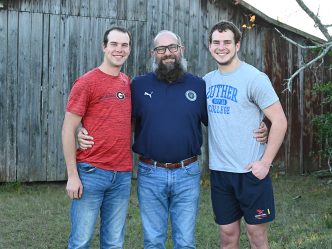Augusta University School of Computer and Cyber Sciences faculty members Dr. Gokila Dorai, Dr. Hoda Maleki and Dr. Gagan Agrawal have been awarded a $569,500 grant from the National Science Foundation.
The award is made possible through the National Science Foundation’s Designing Accountable Software Systems (DASS) program. The project this award will fund is called “A Socio-Technical Framework for Handling Digital Evidence with Security and Privacy Assurances.”
With the increasing use of digital evidence in criminal proceedings, the project team is motivated by the following observations:
- Under the Fourth Amendment of the Constitution, judges often limit device searches to specific data relevant to the investigation, despite the complication that various types of data may be intermixed.
- Once law enforcement has collected digital evidence, they must guard against tampering and prevent privacy invasions by both “inside” and “outside” hackers.
“I believe that this project will lead to significant advancement of digital forensics practices and will provide a delicate balance between effective use of digital evidence and Fourth Amendment privacy rights,” said Dorai, principal investigator on this project.
“This project will also be uniquely positioned to bring together technology developers, researchers and legal scholars to study pressing issues of digital forensics and privacy.”
The project will look at several things, including use of natural language processing (NLP) technologies and semi-structured data management toward developing software that responds to legal directives and retrieves relevant evidence from a device containing intermingled data, as well as using blockchain to create logs of access and modification of data stored by law enforcement.
“I am excited about my contributions to the security aspects of this project, particularly the evaluation process which involves mathematical proofs of the security and privacy properties,” said Maleki, co-principal investigator on this project. “Our analysis involves understanding and formalizing the requirements of a secure digital evidence framework.”
“The project involves a novel application and further development of NLP techniques developed in the context of social media analytics,’’ said Agrawal, professor and associate dean and also a co-principal investigator on the project.
“This solicitation from the National Science Foundation wanted a collaborative team that included both technical and social components, and it is very exciting that we could form a winning team within USG institutes.”
Dorai, Maleki and Agrawal at Augusta University are collaborating with a University of Georgia law faculty member, Dr. Thomas Kadri, who is funded through a separate collaborative $180,000 award.
The team is looking forward to having doctoral students involved in this project from the new PhD program in the School of Computer and Cyber Sciences.
The team will also be working with the Georgia Bureau of Investigation in evaluating their proposed socio-technical framework and said they appreciate GBI’s support.
“This project continues building our research momentum in cybersecurity and privacy,” said Dr. Alex Schwarzmann, dean of the School of Computer and Cyber Sciences.
“This research is motivated by the very real issues associated with the legal considerations in the use of digital sources of information in law enforcement and the novelty of this work includes collaboration of computer science faculty, law faculty and law enforcement agencies.”
 Augusta University
Augusta University




